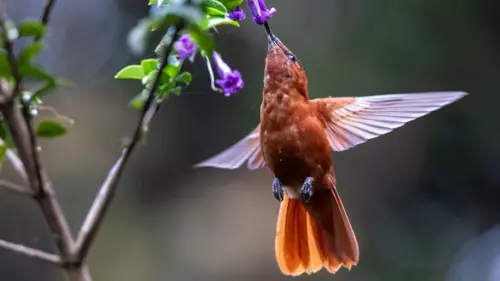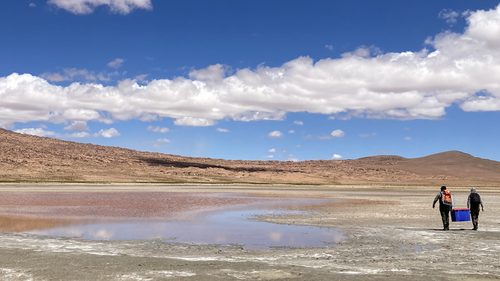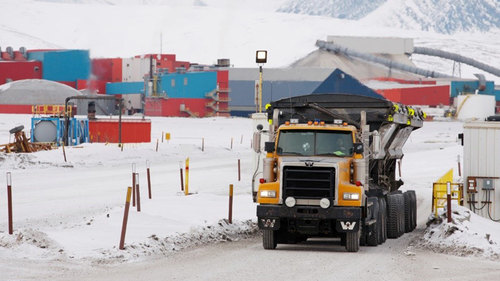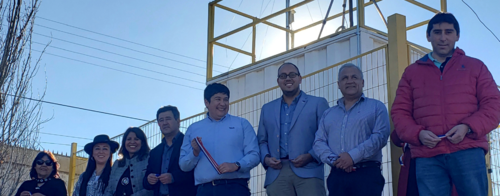Episode 4 Episode 4: Fresh Water Solutions
March 13, 2023
Guests
- Laura Volden, Hydrogeochemist, SRK Consulting
- Chris Kennedy, Director of Water, Teck
- Jillian Lennartz, Manager Sustainability Reporting, Teck (Jill from Teck)
4
In this episode
Water is an essential resource for people, communities, and the environment, and it’s also critical to the mining process. In this episode, we highlight the innovative ways the mining industry approaches water use, from groundwater-scarce regions of Chile to the work around saturated rock fill in British Columbia.
Guests:
Laura Volden, Hydrogeochemist, SRK Consulting
Chris Kennedy, Director of Water, Teck
Jillian Lennartz, Manager Sustainability Reporting, Teck (Jill from Teck)
Transcript
00:00:02
Robin Stickley: I'm starting today's podcast from a place that's very special to me and to my family. It's where I spent my childhood summers. It's not really the location or the where, it's more the what, what it meant to me as a kid. The placeholder, I guess, if you will, that it had in my life. Let me explain.
I'm an Air Force kid. My dad flew jets and we moved all over the world. Pretty much every four years, it was time to box up the house and go on to the next adventure and honestly, I kind of loved it, I thought it was a great way to grow up. But it did mean that very little stayed the same, there was a lot of change but this place was the constant in my life.
My parents stumbled across this beautiful little property on the Sunshine Coast of British Columbia, Canada. Back in 1969, they had saved just enough money to buy the property and then years later, they'd saved enough money to build a small home there.
So why am I telling you all of this? Well, because the property's on a lake and it's a tiny little lake, no powerboats allowed. It is the drinking source for the area. There's only 13 homes on it, and there won't ever be any more than that. And again, it's where my brother and I spent our summers and we loved it. We named the three little islands on this lake, and those names that we gave the islands are the same names that our kids now use for them decades later so it's special and it holds a lot of memories for us. I'm guessing you might have a spot on Earth like this too, that really is just your heart's home.
Today, we're talking about water, specifically freshwater and its role within the mining industry. We'll learn how our most precious resource is being used, treated and released in a sustainable fashion by various mining processes. This is a big topic with a lot of science behind it. So I'm going to chat with Laura Volden, Hydrogeochemist at SRK Consulting, and Chris Kennedy, Director of Water at Teck. We'll hit groundwater, rainwater and everything in between.
I'm Robin Stickley, this is Why We Mine. Hi, I'm back with Jill, Teck's Manager of Sustainability Reporting and our resident scientist with social skills. Yes, you are, you still are. All right, Jill. Today's topic is water, seems like a pretty basic topic, and although I'm not a biologist, I do know 60% of our body's made of water, right?
00:02:49
Jill: Yeah, and about 75% of our brains.
00:02:52
Robin Stickley: Okay, so then it's really not overstating it to say water is the center of life itself.
00:02:57
Jill: I don't know if that's been peer reviewed, but I think it might be backed by science, yes.
00:03:03
Robin Stickley: I'll wait for you to get back to me on that one. Tell me though, so what else is interesting about it?
00:03:08
Jill: All right, I have a million water facts. For instance, did you know that water is also known as the Universal Solvent?
00:03:17
Robin Stickley: Meaning it'll dissolve every substance in the universe? That seems a little extra, don't you think, Jill? Even for water?
00:03:24
Jill: I mean, that's not literally what it means. If you've ever mixed oil and water that doesn't quite work out that well. So the grand title of Universal Solvent comes with some qualifiers. Said by the water oil example, it doesn't dissolve everything, but it does dissolve more substances than any other liquid. It can even dissolve natural things like minerals. It's the reason the ocean is salty. Have you ever been hiking? I hike sometimes, sometimes I get out of the lab and hike. Well, when you're hiking, have you seen some streams that are different colors like reddish brown or around here? Sometimes you can see a milky turquoise?
00:04:03
Robin Stickley: Yeah, absolutely.
00:04:04
Jill: So those different colors are often due to minerals and nearby rocks releasing in the case of red, dissolved iron, or that milky turquoise suspended calcium carbonate, which is just the chemical name for limestone.
00:04:16
Robin Stickley: For limestone, okay. So we've chatted a bit about the human body now we've made our way over to the mountainside stream. The title of the show though is Why We Mine. So let me ask then, how do water and its near limitless capabilities, as you said, as the universe's greatest solvent. How do they relate to mining?
00:04:34
Jill: Yeah, so they relate in many, many ways. For instance, in mining, you end up with lots of overburden. And now overburden is another one of those words that I'm happy to articulate because it's not what it says on the tin. Overburden is just extra rock you need to remove in order to get to the ore that you're looking for.So you have to remove that overburden to get down to the good stuff and that overburden ends up in temporary piles on site at the mines, and then when rain flows over that rock, that water is touching more surface area in that broken up rock than it would be if that rock was solid and still in the ground.
00:05:14
Robin Stickley: Yeah, I'm totally following. That makes sense. So then what effect does that have?
00:05:18
Jill: All right, so depending on what the rock is made of, I'm not a geologist but I've taken quite a few geology classes and rock can be made up of all sorts of different minerals. Depending on what the rock is made of, you can have various natural elements being dissolved and making their way into streams.
00:05:34
Robin Stickley: And that's just rainwater. We've learned already this season, just how central water is to mining. Thank you, Jill, for that additional primer on H2O and its role as a universal solvent. With all of that in mind now, we're going to dive in. We're going to talk to some mining experts about dissolved minerals, rain, rivers, water's role in this ever evolving industry. We'll be back in a moment. You are listening to Why We Mine. I'm Robin Stickley. I'd like to begin today's conversation by talking to Laura Volden about the role of water and how it relates to the mining industry. Laura Volden, welcome to Why We Mine.
00:06:19
Laura Volden: Thanks. Happy to be here.
00:06:21
Robin Stickley: Laura, let's start with getting to know a little bit about you. How did you come to the world of mining?
00:06:27
Laura Volden: When I was growing up, I didn't know this career existed. It's not like I grew up wanting to be a Hydrogeochemist. I ended up in this role because I enjoyed working in groundwater, I was concerned about the impacts of industry on the environment, and I had a strong interest in geology and all those things kind of come together. So I grew up in the Crows Nest Pass, which is a small coal mining community on the Alberta BC border and I knew I always wanted to pursue a career that kept me outside and traveling. So I completed my undergrad degree at the University of Calgary in environmental science with a concentration in geology. From there, I worked as a Hydrogeologist in the oil sands and contaminated sites around Alberta and that's where I first got exposure to the world of mining geochemistry.
And I decided I wanted to specialize in water rock interactions and water quality so I moved out to BC and completed my master's degree at Simon Fraser University in aqueous geochemistry where I focused on studying the occurrence and mobility of selenium in mine wastes and that ended me up in my current position as a consultant in the mining industry.
00:07:37
Robin Stickley: Very cool. I love this idea that all these areas of passion for you coming together. Let's talk about that water rock interaction. That's where I'd like to go into next. I'd love to know a little bit more about the relationship there, especially where it pertains to mining. How water and rock interact, I guess, if you will, around mine sites.
00:07:55
Laura Volden: Yeah, so water management is definitely something that gets a lot of attention during all phases of a mine project, whether that's planning, operations, or into closure of a mine and remediation. Water is obviously used in the processing of ore so a source is required but the quality of water that is in contact with any of the mined materials on sites needs to be evaluated and then managed to try and reduce the risks that it might pose to the environment, which is what I mostly specialize in.
So water can come into contact with mine wastes that are dug up and stored on surface, usually tailings or waste rock through direct precipitation. So things like rainfall or snow melt, surface runoff and groundwater and surface water flows that might interact with those materials at a mine site.
00:08:43
Robin Stickley: Okay, so you're mentioning waste rock here. Our listeners might also know waste rock is overburdened from earlier on in this episode. Tell us where does the waste rock come from and what again, is the relationship here? What does it have to do with water?
00:08:58
Laura Volden: Ore is basically what is economic, that's what you're trying to get out of the ground. So whether that's coal, gold, copper, et cetera, whatever it is, it's often underneath or mixed in with rock that doesn't have economic value. So in the process of mining for that ore the material that is an economic that's brought to surface and stored in waste rock facilities, which are basically large piles of rock that are left on surface at the mine site.
Another thing that's important for water quality at a mine is tailings, which is basically the leftovers from processing of that rock containing the ore. Elements from the periodic table are contained as minerals within the rock in solid form and when that rock stays underground, those elements like being in solid phase, they're stable and when it's dug up and exposed to water and oxygen at surface, weathering can occur and those elements can oxidize.
And at that point they prefer to be an aqueous form, which basically means they're dissolved in water and once they're dissolved in water, they can travel in that form through rivers and streams and anything that might interact at the mine site.
00:10:04
Robin Stickley: Okay, so then once they're traveling through rivers and streams, and that's where we are in the process, is that a good thing or a bad thing?
00:10:11
Laura Volden: Yeah, it depends. So some elements aren't harmful at all and they can exist at pretty high concentrations, where others can have negative impacts on plant and animal life and potentially human health as well if they get released from the mine site into the natural environment.
00:10:26
Robin Stickley: So Laura, you were talking about having impact potentially on animal life, potentially on human health. Can you expand on that? What do you mean when you say impact on animal life and human health?
00:10:37
Laura Volden: Yeah, so some elements aren't harmful, others can have negative impacts. So ore deposits are commonly associated with sulfide minerals, meaning they contain the element that they're trying to mine. For example, copper in combination with sulfur, these minerals also contain traces of potentially harmful elements such as arsenic, lead or selenium. When those minerals are exposed at surface, the sulfur in there oxidizes and can create acidity, which you might have heard referred to as acid bind drainage. I know that's something that comes up in the media sometimes as being a negative impact of mining. Sometimes there are other minerals in the rocks called carbonates that can neutralize the acid which can stop or reduce the migration of some of those harmful elements but certain ones, some selenium in particular, can still travel in the water even if it's what we call neutral mine drainage, so even if the acidity isn't being produced.
00:11:35
Robin Stickley: So when selenium passes through the rock piles and then potentially causes an issue in the environment, is there a solution? How do we tackle a problem like that?
00:11:45
Laura Volden: Yeah, so it's definitely a big problem with mining, trying to manage these types of things. We try to minimize the amount of water that is in contact with these waste materials. It's a multi- layer approach to managing these type of things. We try and minimize the amount of water in contact and then the water that is in contact and comes out as seepage is collected and then once you have that seepage collected, you do water treatment on site. So you either store it on site or treat it to ensure that that impacted water isn't being released into the environment.
00:12:16
Robin Stickley: You're trying to control the amount of water that is impacted or touched or affected but we are dealing with something like rainwater running into rivers, so that's got to be a difficult thing to control?
00:12:27
Laura Volden: Of course. And there's hydrotechnical engineers, all types of engineers that work on these projects, to design diversions around these waste facilities. Old facilities that are on sites that aren't being utilized can be covered so it reduces infiltration from precipitation, and just trying to really minimize the amount of fresh water that comes into contact. So the amount of water you're dealing with on site in treatment is as low of a volume as possible is the ultimate goal.
00:12:57
Robin Stickley: So preemptive strike, trying to keep that water essentially diverted, as you said.
00:13:01
Laura Volden: Yeah, definitely.
00:13:02
Robin Stickley: So in talking about removing selenium from the water, is that something just doubling back now into that last conversation we were having, is there a process by which that can happen naturally, Laura? Or is there technology involved? Is it a man- made process of removing it from water?
00:13:19
Laura Volden: Yeah, so there are, I say natural processes that result in selenium being removed from water, but of course they require specific conditions and a lot of research, engineering planning and monitoring go into it to make sure it's happening effectively. So basically, these treatment technologies try and take processes that might happen naturally and optimize them to be efficient at the scale that's needed for it to occur at a mine site effectively. So mining companies currently with the help of technical consultants and academic researchers have been developing a new method of water treatment where any of that contact water gets injected through wells deep into these old open pits that are now filled with rock and water and then the conditions in those pits are optimal for these natural processes to occur. So they have a lack of oxygen and there's certain microbes present that can remove selenium from the water back to its solid form. And so once that treated water meets discharge criteria, it can be returned to the natural environment.
00:14:21
Robin Stickley: Laura, what does the conversation here have to do with say our listeners, the average citizen, and their interactions with water supply in their day- to- day life?
00:14:31
Laura Volden: For sure. So I definitely get that feedback a lot. There is a lot of technical stuff that goes into it, but I hope this provides kind of a starting point for people to understand the type of efforts that go into addressing the worries that the general public might have about the mining industry. I know there's a lot of media out there when mining projects get developed and how it affects water resources and that risk is real, but with our society's use of technology, the ore that's being produced for mining is essential and I think it's a collective effort to make sure that it's done as responsibly as possible. So during the permitting process for mines, there's the opportunity for public consultation and I encourage anyone who has concerns about mine development in their area to educate themselves on a project and try and get involved and have their input heard and try and understand exactly what does go into this type of management to address these risks.
00:15:28
Robin Stickley: When you can have those kinds of conversations in communities, do you feel like people, once they have a better understanding, have a sense of relief going forward? Do you feel like... Because I would assume if you're going into a community mining, that is one of the biggest concerns right out of the gate is water supply, water source.
00:15:47
Laura Volden: Of course. The more you understand something, hopefully the more comfortable you get, at least understanding what's being done to address those worries that you might have about it. At least for me, I feel a lot more comfortable being involved in the mining industry and being on this side of it and being able to contribute to these solutions.
00:16:05
Robin Stickley: And knowing what's being done.
00:16:07
Laura Volden: Yeah, exactly.
00:16:08
Robin Stickley: So Laura, you said that the mining industry, the mining world hasn't always been as concerned in the past, perhaps with water quality, but that is truly changing now, correct?
00:16:21
Laura Volden: Yeah, definitely. I think the mining industry in North America has already come a long way with respect to sustainability and water stewardship and it's on a positive trajectory to continue that into the future. It's pretty difficult to obtain mine permits in Canada without sufficiently demonstrating that you understand the risks that are posed by your project and you have a plan to address them.
And then on top of the regulatory hurdles, I work with a lot of people personally in the mining industry who have dedicated their careers to this and have that personal investment in seeing these projects progress in a responsible way.
00:16:57
Robin Stickley: So looking ahead, Laura, looking at the next decade or even the next two decades, can you talk a little bit about what you see for the mining industry in terms of its evolution where water quality and conservation's concerned?
00:17:11
Laura Volden: Yeah, so I think the new treatment technologies that are coming out, the amount of effort that is put into reducing these negative impacts makes me optimistic about where this is going. I see a lot of these new treatment technologies being implemented at a larger scale and hopefully reducing the type of downstream effects we see in the receiving environment now.
00:17:33
Robin Stickley: Laura, thank you so much for joining us today. I learned a lot and it was just a good opportunity to chat with you and learn more about water and rocks and all the things that you know about. Thank you so much.
00:17:46
Laura Volden: Yeah, no problem. I'm happy to be involved and hopefully this was educational for everyone who tuned in.
00:17:51
Robin Stickley: Thanks so much, Laura. Up next, we'll chat with Chris Kennedy, director of Water at Teck.
Stay tuned for the next part and just a reminder, Why We Mine is a podcast brought to you by Teck that explores how the world we know relies on the products of mining we need to thrive. I'm your host, Robin Stickley. I hope you're liking the show so far. If so, please follow, subscribe and share Why We Mine with your friends.
Welcome back. We're continuing our discussion on the mining industry's relationship with water. Next up we have Chris Kennedy, director of water at Teck. Chris Kennedy, welcome to Why We Mine. Great to have you with us today.
00:18:44
Chris Kennedy: Thanks very much Robin, I'm really excited to be here.
00:18:46
Robin Stickley: Chris, let's talk about your relationship to water and maybe how you think about it and maybe how even that's changed a bit during the course of this career.
00:18:54
Chris Kennedy: I grew up as a competitive swimmer and loved all things water related and so there's always been some aspect of me drawn to water. And it started out when doing academic work, I was looking at these weird mineral bacterial formations on the bottom of the ocean and again, how in some weird way it does connect to things at Teck, but it was really like this micro- scale in a way, in a remote environment 600 kilometers off the coast of DC where we were doing this work and just knowing the importance of some of the things that these minerals might do for cycling metals in the ocean and things.
But it was pretty small and not thinking about the world around me to, as I went on and understanding some of the challenges mining businesses were facing and then thinking a lot more about closure. And now in my current role where... and with the previous mining company about the communities and people are affecting is just how critical water is on all pieces. And so we want to one day mine without water but we can't yet and so we have to mount with water, but nothing that's alive on the planet can exist without it. And so those are at opposing sides a little bit.
00:20:00
Robin Stickley: So when I was chatting with Laura Volden earlier in the episode, she was talking about how rain and groundwater interact essentially at mine sites and what that means. So how do mining companies prevent the impact from that interaction? Because aren't you at this point trying to... You're dealing with mother nature, right? So how are you controlling or harnessing or diverting that?
00:20:22
Chris Kennedy: That's a great question and what we need to understand right now, all we've ever done is focus all of our attention on the immediate ore, the resource, the economic part of it, not realizing where all the liability and cost and risk to the environment would be as surrounding the ore in a way.
And so, one thing that the industry's doing, and Teck included, is understanding that waste at the same level as the ore. And what that means is instead of having a handful of samples, having tens of thousands of samples so you can really understand the risk this material poses, and that is a big fundamental shift for industry to think about investing that much time and effort into something that's not going to make any money but will cost you money and cause you risk down the road.
And so, you can then put together predictions of where that rock might be the problem and you can then get a bit more surgical on managing the risk properties or the risk portions of that material when you're mining so you don't have just unknown risks and water quality challenges all over your site.
00:21:17
Robin Stickley: Does Teck have locations where this is a bigger concern than others?
00:21:20
Chris Kennedy: A lot of our mine sites, any mining company where typically the commodity or the metal that you're after, if it's gold or if it's coal in the Elk Valley, these minerals that are classified as sulfides. They're just what's often that brings the economic value but they're also what the water quality risk is.
So there are challenges at probably almost every mining operation to some degree, some worse than others. For the Elk Valley for Teck, it is a big deal for the work that we're doing because selenium is a known problem in the Elk Valley and it's the same thing from the oxidation of our rock. So it's not a chemical that we're using or adding, it's just the rock oxidizes and when water contacts that oxidize rock it releases selenium. So that is the area where we have actually built extremely large trials and try like, " Well, how big is that?" Well, this trial is a kilometer and a half long by 400 meters wide, almost half a kilometer wide, to actually test these systems of source control to stop the selenium leaching within the pile versus needing a whole lot of treatment downstream.
00:22:26
Robin Stickley: Let's talk a little bit more about treatment, Chris, because I'm interested in understanding what goes on during mining. I mean, I know there's a lot that has to go on once that mine is closed, right? But is there something that can be done during the course of the mine being up and running where you can try and mitigate risks, mitigate the risk of pollution and leaching?
00:22:47
Chris Kennedy: In terms of treatment there's a number of things. I'd say two sort of bins, if you will, that we're chasing. One is we call active treatment and so we have some actual large buildings that treat for selenium and nitrate. They use bacteria actually to take those constituents out in these treatment plants. We also figured out how to put that technology in old mined out pits, in fact so we have, and this is what we call a saturated rock fill or an SRF. So we have an old mined out pit. Water goes in, there's naturally occurring bacteria, we don't add bacteria, we just give them some food and then they take out the nitrate and selenium. We pull the water out and then it has 95% of the nitrate and selenium removed. So that's the one bin of active treatment.
The second one, which should not come after mining, but it should be coming while you're building your mine and it should be designed before ever mine, is actually building your waste storage facilities so that they can keep constituents in and not leach them. And there's an extra layer of protection is to keep them from leeching and then actually have layers within, if you want to call it a layer cake, that can actually do a bit of treatment. The same thing the treatment plant would do the same natural bacteria, give them little environments within these facilities. So then actually if there is a little bit of leaching, they can actually pull a selenium and nitrate out within the facility before it ever leaves, and that absolutely has to get done while you're mining.
00:24:04
Robin Stickley: Okay. And then are you treating water in perpetuity forever after the fact? After mine closes, or no? Or is it different case by case?
00:24:11
Chris Kennedy: So interesting question. The goal is no, we don't want to, but for some sites because of how these sulfide minerals and how much of them are it is in terms of our lifetimes, it'll keep leaching for our lifetime at mines around the planet. But the goal is to figure out how then say, as we continue to mine, how to use these learnings to perhaps build some of these source control facilities on top of areas where that was never existed so that we can actually help that other legacy facilities that say Teck didn't even produce to then have them stop mining so you don't have to have water treatment forever. Water treatment forever is definitely being accepted in the industry, it is not the answer. If you have to have perpetual treatment, you really have to ask yourself, " Is this really what we want to do?"
00:24:55
Robin Stickley: I want to ask, Chris, a little bit about freshwater equals quality of life and so many places around the world and so I can imagine that in some communities people are concerned about the idea of a mine being in their community, in their backyard, if you will. So let's talk perhaps to some listeners who may feel that skepticism or that concern about the mining world and they wonder if indeed this industry cares about water protection or community safety. What would you say to people about that? What's actively being done around water protection?
00:25:29
Chris Kennedy: That's fair, and in mining it does not have its past reputation is not great and part of that I'll defend because some of these rusting reactions I've been calling them, or browning apple, I don't think we fully understood how long and when they might show up. Sometimes these issues show up during a mine operation or sometimes they don't show up till the mine's closed. The temporal side of it was unknown. We've come leaps and bounds of the last few decades in understanding when and how that might go. So that is definitely different.
The other thing though I will say, the mining industry, do they care? Honestly, for better or for worse, if we don't figure this out, we won't get to keep mining. I think that's pretty plain and simple. I would say Teck and some others are putting their money where their mouth is by having these massive facilities where we don't even know if they'll work yet. But we know we have to do it. There's research and data that says it can, and we just have to get on with it and figure it out versus just saying, " Well, we want to." So I think that's what's really different in that I haven't seen it in the industry before, this kind of level of investment on figuring these things out.
So I have to stay optimistic that we are going to change and that's what keeps me coming to work every day, for sure.
00:26:33
Robin Stickley: Such a candid conversation with you, Chris. I really appreciate all of your insightful answers and all of the good information. Thank you so much.
00:26:40
Chris Kennedy: Thanks a lot, Robin. It was pretty fun for me as well.
00:26:49
Robin Stickley: I'm learning mining has a complicated relationship with water. As Laura Volden told us, historically, mining wasn't concerned with water quality, but as the saying goes, when you know better, you do better. We heard the experts wondering out loud about the future, maybe one day mining without clean water and that aspirational goal to mine without water, period. I sense what's happening on the ground right now is a new- found obligation. The mining world knows it must lead the way in understanding water related impact and risks as well as cutting edge innovation that will help conserve the planet's greatest natural resource, a commitment to know better and do better.
I'm Robin Stickley. Thanks for listening to this podcast, brought to you by Teck. This is Why We Mine. Why We Mine is brought to you by Teck. Our producer is Andrew Pemberton-Fowler. Our sound engineer is Diego Domine, and our production assistant is Hugh Perkic. Additional production support provided by JAR Audio.
Bonus Content
Also in this series
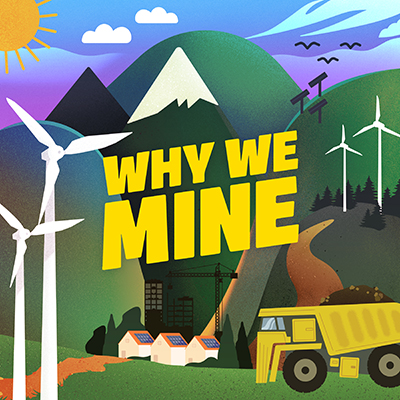
EPISODE 6
Episode 6: Better Than We Found It
We all know mining disturbs land, so proper land reclamation is a critical part of the process. Modern mines aren’t just cleaning up after themselves. Their goal is to leave an area better, stronger, and more diverse than they found it.

EPISODE 5
Episode 5: Mining and Investing in Global Communities
How does the mining industry ensure it builds strong relationships with communities and Indigenous Peoples, respects human rights, and creates lasting benefits in the regions where it operates? In this episode, we explore the many ways mining companies co
